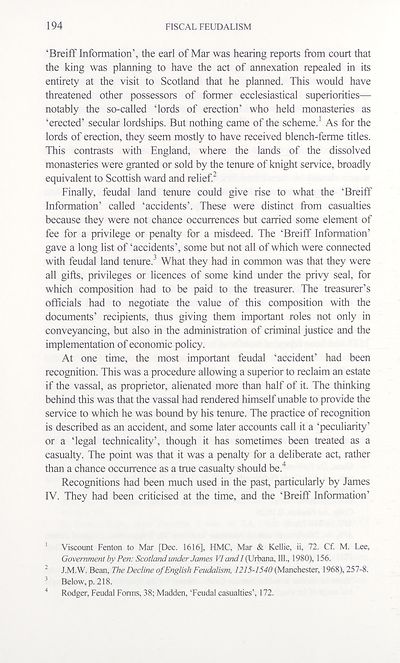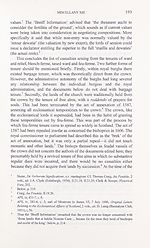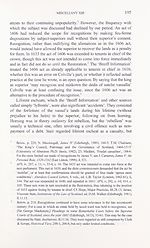Series 5 > Miscellany [of the Scottish History Society] XIII
(209) Page 194
Download files
Complete book:
Individual page:
Thumbnail gallery: Grid view | List view

194
FISCAL FEUDALISM
‘Breiff Information’, the earl of Mar was hearing reports from court that
the king was planning to have the act of annexation repealed in its
entirety at the visit to Scotland that he planned. This would have
threatened other possessors of former ecclesiastical superiorities—
notably the so-called ‘lords of erection’ who held monasteries as
‘erected’ secular lordships. But nothing came of the scheme.1 As for the
lords of erection, they seem mostly to have received blench-ferme titles.
This contrasts with England, where the lands of the dissolved
monasteries were granted or sold by the tenure of knight service, broadly
equivalent to Scottish ward and relief.2
Finally, feudal land tenure could give rise to what the ‘Breiff
Information’ called ‘accidents’. These were distinct from casualties
because they were not chance occurrences but carried some element of
fee for a privilege or penalty for a misdeed. The ‘Breiff Information’
gave a long list of ‘accidents’, some but not all of which were connected
with feudal land tenure.3 What they had in common was that they were
all gifts, privileges or licences of some kind under the privy seal, for
which composition had to be paid to the treasurer. The treasurer’s
officials had to negotiate the value of this composition with the
documents’ recipients, thus giving them important roles not only in
conveyancing, but also in the administration of criminal justice and the
implementation of economic policy.
At one time, the most important feudal ‘accident’ had been
recognition. This was a procedure allowing a superior to reclaim an estate
if the vassal, as proprietor, alienated more than half of it. The thinking
behind this was that the vassal had rendered himself unable to provide the
service to which he was bound by his tenure. The practice of recognition
is described as an accident, and some later accounts call it a ‘peculiarity’
or a ‘legal technicality’, though it has sometimes been treated as a
casualty. The point was that it was a penalty for a deliberate act, rather
than a chance occurrence as a true casualty should be.4
Recognitions had been much used in the past, particularly by James
IV. They had been criticised at the time, and the ‘Breiff Information’
1 Viscount Fenton to Mar [Dec. 1616], HMC, Mar & Kellie, ii, 72. Cf. M. Lee,
Government by Pen: Scotland under James VI and I (Urbana, 111., 1980), 156.
2 J.M.W. Bean, The Decline of English Feudalism, 1215-1540 (Manchester, 1968), 257-8.
3 Below, p. 218.
4 Rodger, Feudal Forms, 38; Madden, ‘Feudal casualties’, 172.
FISCAL FEUDALISM
‘Breiff Information’, the earl of Mar was hearing reports from court that
the king was planning to have the act of annexation repealed in its
entirety at the visit to Scotland that he planned. This would have
threatened other possessors of former ecclesiastical superiorities—
notably the so-called ‘lords of erection’ who held monasteries as
‘erected’ secular lordships. But nothing came of the scheme.1 As for the
lords of erection, they seem mostly to have received blench-ferme titles.
This contrasts with England, where the lands of the dissolved
monasteries were granted or sold by the tenure of knight service, broadly
equivalent to Scottish ward and relief.2
Finally, feudal land tenure could give rise to what the ‘Breiff
Information’ called ‘accidents’. These were distinct from casualties
because they were not chance occurrences but carried some element of
fee for a privilege or penalty for a misdeed. The ‘Breiff Information’
gave a long list of ‘accidents’, some but not all of which were connected
with feudal land tenure.3 What they had in common was that they were
all gifts, privileges or licences of some kind under the privy seal, for
which composition had to be paid to the treasurer. The treasurer’s
officials had to negotiate the value of this composition with the
documents’ recipients, thus giving them important roles not only in
conveyancing, but also in the administration of criminal justice and the
implementation of economic policy.
At one time, the most important feudal ‘accident’ had been
recognition. This was a procedure allowing a superior to reclaim an estate
if the vassal, as proprietor, alienated more than half of it. The thinking
behind this was that the vassal had rendered himself unable to provide the
service to which he was bound by his tenure. The practice of recognition
is described as an accident, and some later accounts call it a ‘peculiarity’
or a ‘legal technicality’, though it has sometimes been treated as a
casualty. The point was that it was a penalty for a deliberate act, rather
than a chance occurrence as a true casualty should be.4
Recognitions had been much used in the past, particularly by James
IV. They had been criticised at the time, and the ‘Breiff Information’
1 Viscount Fenton to Mar [Dec. 1616], HMC, Mar & Kellie, ii, 72. Cf. M. Lee,
Government by Pen: Scotland under James VI and I (Urbana, 111., 1980), 156.
2 J.M.W. Bean, The Decline of English Feudalism, 1215-1540 (Manchester, 1968), 257-8.
3 Below, p. 218.
4 Rodger, Feudal Forms, 38; Madden, ‘Feudal casualties’, 172.
Set display mode to:
![]() Universal Viewer |
Universal Viewer | ![]() Mirador |
Large image | Transcription
Mirador |
Large image | Transcription
Images and transcriptions on this page, including medium image downloads, may be used under the Creative Commons Attribution 4.0 International Licence unless otherwise stated. ![]()
| Scottish History Society volumes > Series 5 > Miscellany [of the Scottish History Society] XIII > (209) Page 194 |
|---|
| Permanent URL | https://digital.nls.uk/127316037 |
|---|
| Description | Over 180 volumes, published by the Scottish History Society, containing original sources on Scotland's history and people. With a wide range of subjects, the books collectively cover all periods from the 12th to 20th centuries, and reflect changing trends in Scottish history. Sources are accompanied by scholarly interpretation, references and bibliographies. Volumes are usually published annually, and more digitised volumes will be added as they become available. |
|---|


